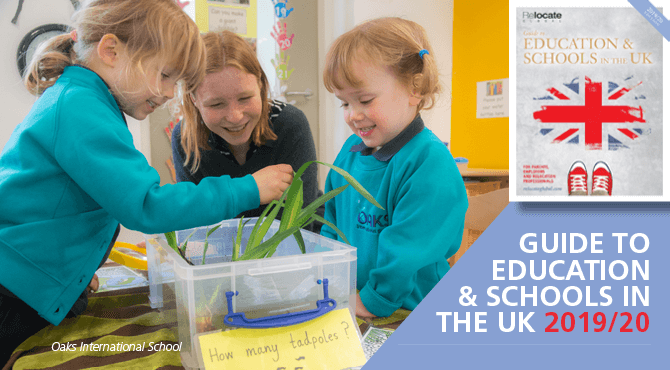Mobility’s impact on children: managing the challenges
Relocation can be daunting, especially for children, who must say goodbye to a familiar home, school and friends. Child psychologist Douglas Ota shares his tips for helping a child to cope with change.
Now available as an ebook on Amazon! Simply download from Amazon onto your Kindle, mobile phone or tablet to read wherever you are!
As a psychologist specialising in mobility, I've counselled families on the move for 25 years, and have learned what children are really saying when they move. This article gives them a voice.To put this subject into perspective, you should know that, in 2009, John Hattie published his book Visible Learning, which combined 52,637 published studies, surveying millions of students worldwide.Hattie asked this massive repository of data one simple question: what actually works to improve student learning? The result was 138 factors that influenced learning. Which factor emerged as the most detrimental to student learning outcome? Moving.It doesn't have to be this way. Mobility across cultures can be one of the richest sources of learning and personal growth that life has to offer. But these benefits only occur when mobility's massive challenges are managed well.This article shares ten tips that can help, phrased as if they're coming directly from children. After all, they're the ones who taught me these things.

1. Help us prepare for the tough part, too
Moving abroad has a glamour factor. The thrills involved blind many to a less-glamorous reality: moving is an experience of loss. Important people, places, and roles are left behind.After the 'honeymoon phase', many people, including children, can be caught off guard, and feel lost and bewildered. Third Culture Children, by Pollock and Van Reken, explains in depth the impact of this on children.2. Show us how to say 'goodbye', so that we'll be able to say 'hello'
Plan goodbye parties and rituals for your child and for yourself. One school in the Netherlands invites students to put names and messages on a wooden clog to give to each departing student. By saying goodbye well, you're doing a favour for all involved.Only if people have been helped to do something that we all find inherently difficult – like saying goodbye – will they be able to welcome new people into their lives.This explains why a goodbye party for yourself is essential: it's good for you, which is good for your family, and it models a positive coping skill for your child. In my book Safe Passage, What Mobility Does to People and What International Schools Should Do About It, I refer to this tip as the First Law of Transitions.3. Listen to us
The stress of moving unleashes powerful feelings. For a successful mobility experience, these feelings need to come out. Do not underestimate the healing power of simply attending to whatever a child is saying.Try just looking, nodding, offering an occasional 'oh?' or 'OK', and nothing else. Having you as an audience is often all a child needs.4. Help us by starting early
According to David Pollock (who wrote Third Culture Children), it takes six months to pack up your heart and six months to unpack it. Packing up your home is hard, but packing hearts and minds well is harder – and more important.Start discussing how your child is feeling about the move long before it actually occurs. And keep discussing it well after it's happened. 'How are you feeling about the move?' is all the prompting they might need. Then listen.
5. If I'm an introvert, remind me that I'm not to blame for my personality
Dealing with mobility successfully means processing all the associated emotions well. But personality is a bottleneck. How quickly one tends to process emotions has a great deal to do with personality factors.The more extrovert a person is, and the more open they are to new experiences, the more quickly they will adapt through the challenges of mobility. Conversely, the more introvert, shy, and cautious a person is, the longer they will require to process the feelings.This can be an opportunity to educate a child about the kind of personality they've received in their genes, and explain to them that personality is like eye colour: it's something you're born with.Introverted, shy and cautious children require help understanding that their personalities are needed in the world, and that they tend to thrive in certain settings (in nature, creative endeavours, and so on).However, such children need tricks to deal with a life on the road. For example, teach them to look for somebody else who's probably feeling afraid, like somebody standing alone in the playground. Teach your child to take a big, deep breath, walk up to that person, introduce themself, and then find out where the person has come from and what their hobbies are. Before they know it, they may have a friend.6. Give us some choices
For many children, the experience of having to move is an exercise in 'choicelessness'. The Big People seem to decide everything: whether a move is happening, where it's going to occur, and when it's going to happen.Human beings seek control over the parameters of their existence. The long-term absence of control over these parameters can lead to two alternatives: angry rebellion or learned helplessness. (A word of reassurance to parents of rebellious teens: angry rebellion is healthier than learned helplessness. The ego is at least fighting for survival, rather than giving up.)Against this backdrop, it becomes important to give youngsters choices about things that reasonably belong in their domain. Such choices can be large ones, like which school to attend, or seemingly minimal ones, like what to wear or what to have for lunch. Supporting a child's ability to choose, through times when so much for them feels out of control, helps build a confident child. See Martin Seligman's The Optimistic Child for more ideas.7. Welcome our difficult feelings
In my experience of counselling children around mobility issues, it's the feeling that they don't have permission to have negative feelings that leads to trouble.Many children feel under pressure from their parents ('Why can't you just be positive for a change?') or their environment ('You're so lucky to be going to live abroad!') to bury negative feelings. But buried negative feelings pop up unpredictably later in life.When children are allowed to have negative feelings, and when they're encouraged to express such feelings within appropriate bounds ('We get it that you're mad about being here, and that's fine, but we expect you not to insult anybody in the process'), these feelings get validated and ultimately relax.8. Listen to us reflectively
Beyond simply listening, you can practise reflective listening with children. This means listening for the core message in what a child is saying. When you 'hear' the core message (by reading between the lines), repeat it back, perhaps in a tenuous fashion (such as in a question), to see if you have it right. If your intention is to truly understand the child, you cannot go wrong.Even if you do get it wrong, your positive intention will shine through, and the child is likely to correct you. For example, if your ten-year-old comes home from school, throws his backpack on the floor, and screams, 'I hate it here! I was all by myself at lunch again!', then – after taking a deep breath or two – you could say, 'Wow. You are furious with this place and with us. You sound like you want to go back home right now!'A ten-year-old's anger may melt into tears at that moment, and you will be able to console him. The art of reflective listening entails remembering that listening well does not mean agreeing. See Faber and Mazlish's How To Talk So Children Will Listen and Listen So Children Will Talk for more tips on listening well.
9. Help us pick 'pivotal' people
Human beings don't exist in vacuums. We need to be seen and recognised to feel real and safe. If this were not true, Facebook, Twitter, and Instagram would not have drawn the billions of devotees they have.If mobility causes your child to feel their identity has been erased, this may be as a result of the loss of trusted audiences. The trick is to maintain 'pivotal people' who aren't moving; people who are staying put and are a trusted audience, around whom your child's story can rotate.Invite friends, aunts, uncles, coaches, close neighbours – anyone who is not moving and who has been important in your child's life – to be a 'pivotal person' for them. Ask these people to drop a line once a month, for six months or so, just to check in on your child, to ask how things are going, and to hear about the new life.10. Maintain some of our traditions
The experience of mobility shifts everything in our landscape. In such a situation, the human psyche desperately gropes for things that have remained the same. Most families maintain some continuity in space by bringing furniture, pictures, and precious objects with them.Continuity in time is equally important. It can be cultivated by doing certain things you used to do, at the same time in your new place.Perhaps you used to kick a ball with your child after work, or your family enjoyed brunch every Sunday, or you went to the movies on the first Friday of the month. By taking such traditions with you wherever you go, you create continuity for your family in both space and time. See The Intentional Family, by William Doherty, for more ideas.Everything this article has discussed is just as true for those who get left behind. And this is the nature of the expatriate existence: people we care for leave us regularly, throwing us into transition even though we haven't packed a single suitcase. Any of the tips discussed here are as relevant when your child's best friend moves away as when your child is the one who is on the move.Douglas Ota trained as a clinical child psychologist. He was a counsellor at the American School of The Hague for many years, and is now a registered child psychologist in private practice. He counsels children, adolescents, couples and families, and also consults with international schools and organisations on building programmes to address the challenges and opportunities of mobility.This article was refreshed on 24 July 2019.The Guide to Education & Schools in the UK is designed to help relocating parents make informed education choices. For volume options, co-branded editions, digital or online licence agreements and advertising opportunities, call Fiona Murchie on +44 (0)1892 891334 or email fiona@relocatemagazine.com
For more education and school related news, visit our Education and Schools pages.Access hundreds of global services and suppliers in our Online Directory
 Get access to our free Global Mobility Toolkit
Get access to our free Global Mobility Toolkit  © 2019. This article first appeared in the 2016 edition of the Guide to International Education & Schools, published by Profile Locations, Spray Hill, Hastings Road, Lamberhurst, Kent TN3 8JB. All rights reserved. This publication (or any part thereof) may not be reproduced in any form without the prior written permission of Profile Locations. Profile Locations accepts no liability for the accuracy of the contents or any opinions expressed herein.
© 2019. This article first appeared in the 2016 edition of the Guide to International Education & Schools, published by Profile Locations, Spray Hill, Hastings Road, Lamberhurst, Kent TN3 8JB. All rights reserved. This publication (or any part thereof) may not be reproduced in any form without the prior written permission of Profile Locations. Profile Locations accepts no liability for the accuracy of the contents or any opinions expressed herein.

































